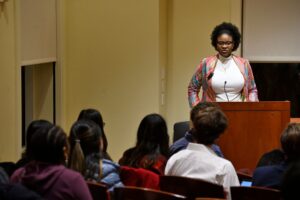
Even in exile from her home in Togo, Farida Nabourema has remained on the forefront of the battle for democracy and freedom of speech in her home country.
For eight years, Nabourema has been the face of the movement to oust the president of Togo and bring free elections to the small West African nation. She has written more than 400 articles about her government’s corruption, serves as the executive director of the Togolese Civil League, and was named one of the 100 Most Influential Youth in Africa by the Africa Youth Awards.
On Wednesday, Nabourema visited Johns Hopkins University to speak about her experiences supporting democracy in a dictatorship known for violently silencing its critics. The event, held in Mason Hall, was co-sponsored by the Milton S. Eisenhower Symposium, the Foreign Affairs Symposium, and the Stavros Niarchos Foundation Agora Institute as part of its Democracy Dialogues series.
Togo, a former French colony located between Ghana and Benin, first gained independence in 1960. The country became a military dictatorship in 1967 after Gnassingbé Eyadéma ousted the country’s first two presidents in military coups. Eyadéma ruled the country as a president until his death in 2005, when his son Faure Gnassingbé was installed as the nation’s new leader in yet another military coup.
Nabourema was just 15 when Gnassingbé began his rule. Following his ascension to the presidency, an anti-government rally broke out in which government forces killed three protestors. Following an election two months later, where government forces terrorized and imprisoned opponents of the regime at the polls, protests again broke out, this time resulting in a death toll of more than 400 citizens.
